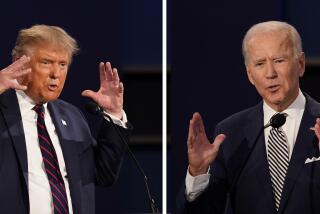Ex-Actors Again Face Equal-Time Rule : Television: FCC will restore the provision that forces stations to provide air time to competing candidates when an opponent’s show-business work is shown.
- Share via
Rep. Robert K. Dornan (R-Calif.), Rep. Fred Grandy (R-Iowa), Sonny Bono and the nation’s other actors-turned-politicians may again be haunted by work from their show-business days.
Under revised Federal Communications Commission regulations that go into effect later this year, election opponents of one-time performers will be eligible to receive equal time when their adversary’s old work is rerun on television.
The FCC had exempted such appearances in a provision that went into effect in 1992, ruling that a program only triggers the equal-time provision if it is “controlled, sponsored or approved by the candidate.”
Prior to 1992, television and radio stations, when requested, had to provide equal time to opposing candidates whenever a candidate who had qualified for the ballot appeared recognizably--by either picture or voice--on a broadcast outside of bona fide newscasts, interview programs, documentaries or spot coverage of news events--as, for instance, when Ronald Reagan turned up in late-night movies during his presidential campaigns of 1976, 1980 and 1984.
Most stations tried to avoid the problem by not showing series episodes and movies that included actors-turned-candidates during campaign periods. Occasionally they slipped up, and the opponents would be granted time to boost their candidacies.
The FCC changed the rules in 1992, but a lawsuit over another aspect of the equal-time regulations led the commission in January to reinstitute the old rules. They have not yet gone into effect, pending their publication in the Federal Register, the daily government-published document listing every rule-making change of all federal agencies.
Southern California stations figure to be most impacted under the revised regulations, as at least three former actor-entertainers are running for various offices in the June 7 primary.
For example, a station would either have to edit or refrain from showing the 1988 film “Hairspray” because Sonny Bono appears in it, and he is running for a Republican congressional nomination in Riverside County. Otherwise, the station might be faced with having to give equal time to the other candidates.
Also affected when the FCC revisions take effect will be Dornan, who is running for re-election in his Orange Country congressional district, and Sheila James Kuehl--best known for her portrayal of Zelda Gilroy in CBS’ 1959-63 sitcom “The Many Loves of Dobie Gillis”--who is seeking a Democratic state Assembly nomination in Los Angeles.
Meanwhile, neither the new nor the old equal-time regulations will have an impact on the nation’s most famous potential candidate--disc jockey Howard Stern--for more than six months.
Baker said the regulations do not come into play until a candidate legally qualifies for the ballot. In the case of Stern, who said last week he would seek the Libertarian Party nomination for governor of New York, that would not occur until Oct. 3.
If Stern qualifies as a candidate on that date, radio stations carrying his morning program in New York state will either have to drop him from the air or grant a corresponding amount of time to all the other qualified candidates--from four to five hours a day. (Stations outside of New York would not be impacted because the regulations only affect stations that broadcast where the election is being held.)
Entertainment programming on cable networks has never been subject to the FCC’s equal-time provisions.
More to Read
The complete guide to home viewing
Get Screen Gab for everything about the TV shows and streaming movies everyone’s talking about.
You may occasionally receive promotional content from the Los Angeles Times.






